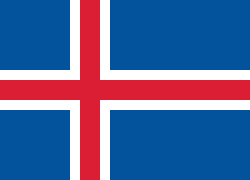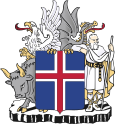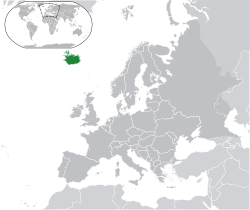Iceland Ísland (Icelandic) | |
|---|---|
| Anthem: Lofsöngur "Hymn" | |
Location of Iceland (dark green) | |
| Capital and largest city | Reykjavík 64°08′N 21°56′W / 64.133°N 21.933°W |
| Official language | Icelandic |
| Ethnic groups (2021) |
|
| Religion (2022) |
|
| Demonym(s) |
|
| Government | Unitary parliamentary republic |
| Halla Tómasdóttir | |
| Kristrún Frostadóttir | |
| Þórunn Sveinbjarnardóttir | |
| Legislature | Althing |
| Formation | |
| 9th century | |
| 930–1262 | |
| 1262–1397 | |
| 1397–1523 | |
| 1523–1814 | |
| 14 January 1814 | |
Constitution and limited home rule | 5 January 1874 |
Extended home rule | 1 February 1904 |
Sovereignty and personal union with Denmark | 1 December 1918 |
| 17 June 1944 | |
| Area | |
Total | 103,125 km2 (39,817 sq mi) (106th) |
Water (%) | 2.07 (as of 2015) |
| Population | |
2025 census | 389,444 (172nd) |
Density | 3.78/km2 (9.8/sq mi) (235th) |
| GDP (PPP) | 2023 estimate |
Total | |
Per capita | |
| GDP (nominal) | 2023 estimate |
Total | |
Per capita | |
| Gini (2018) | low inequality |
| HDI (2022) | very high (3rd) |
| Currency | Icelandic króna (ISK) |
| Time zone | UTC (GMT/WET) |
| Date format | dd.mm.yyyy |
| Calling code | +354 |
| ISO 3166 code | IS |
| Internet TLD | .is |
Website island.is | |
Table of Contents
Introduction to Product Safety in Iceland
Product safety is a crucial aspect of consumer protection in any country, and Iceland is no exception. The realm of product safety encompasses the processes and regulations that ensure that manufactured goods do not pose any risk to users. In Iceland, safeguarding consumer health and wellbeing has always been a priority, and the country employs a thorough framework of safety standards and guidelines. This framework effectively addresses the potential hazards associated with various products, ranging from electronics to food items.
Iceland’s commitment to product safety can be observed through its adherence to European Union regulations and its own national laws. The nation aligns its safety standards with EU directives, ensuring that products entering the Icelandic market comply with rigorous safety tests and quality controls. This alignment not only facilitates the trade of goods but also guarantees that consumers can trust the safety and integrity of the products they purchase.
Additionally, the Icelandic government and relevant authorities engage in regular monitoring and enforcement to uphold these standards. This includes inspections, certifications, and the implementation of recall procedures when necessary. Such proactive measures are instrumental in preventing unsafe products from reaching the market, thereby mitigating potential health risks to consumers. The overarching goal of these regulations is to promote a consumer culture characterized by safety and reliability, which is vital for public health.
In conclusion, product safety plays an essential role in Iceland’s market structure, ensuring that both imported and domestically produced goods meet established safety standards. Through robust regulations and vigilant oversight, Iceland strives to protect its consumers and foster a safe shopping environment, reinforcing its reputation as a nation dedicated to public health and consumer rights.
Regulatory Framework Governing Product Safety
The regulatory framework governing product safety in Iceland is primarily established through a series of laws and directives designed to ensure that products distributed in the country meet stringent safety standards. The cornerstone of this framework is the Product Safety Act, a legislation that mandates the responsibility of manufacturers, distributors, and retailers to ensure that products placed on the market are safe for consumers. This law is crucial in preventing harm to consumers and is enforced rigorously by pertinent authorities.
The Icelandic Government plays a vital role in overseeing product safety regulations through various agencies. The Directorate of Internal Revenue (Skattritið) and the Food and Veterinary Authority (MAST) are instrumental in the enforcement of these standards. Their responsibilities include monitoring products for compliance with the established safety norms, conducting inspections, and addressing reports of hazardous products. These agencies work collaboratively to ensure that any goods that fail to meet safety requirements are removed from the marketplace swiftly, thereby protecting consumers.
In addition to the Product Safety Act, Iceland adheres to European Union directives, particularly those pertaining to health, safety, and environmental protection. This alignment with EU legislation not only standardizes product safety across member states but also enhances the rigor of Icelandic regulations. Manufacturers must be cognizant of these regulatory requirements when designing, producing, and distributing products, as compliance is not optional but a legal necessity. Moreover, the consequences for non-compliance can include fines, legal action, and the potential for product recalls.
Overall, the regulatory framework governing product safety in Iceland encompasses various laws and supervisory bodies, all dedicated to ensuring that products in the Icelandic market are safe for consumer use. Such measures reflect the country’s commitment to maintaining high safety standards and protecting public health.
Requirements for Manufacturers
In Iceland, manufacturers play a pivotal role in ensuring the safety and compliance of products before they reach consumers. A fundamental requirement is adherence to established safety regulations, which are deeply rooted in European Union legislation, as Iceland is a member of the European Economic Area (EEA). These regulations dictate that products must not pose any risk to health, safety, or the environment. Consequently, manufacturers are tasked with rigorously adhering to these legal frameworks to avoid penalties and maintain consumer trust.
One of the key responsibilities of manufacturers in Iceland is conducting thorough risk assessments. This process involves identifying potential hazards associated with a product throughout its life cycle, including production, usage, and disposal. By recognizing these risks early, manufacturers can implement effective measures aimed at mitigating them. This proactive approach is not only a regulatory requirement but also an ethical obligation to safeguard consumer well-being. Risk assessments should be documented meticulously as they serve as a foundational element of product safety and regulatory compliance.
Furthermore, documentation of safety measures is crucial for manufacturers. This documentation should detail all testing procedures, materials used, design considerations, and modifications made to enhance product safety. It is vital that these records are accessible, as regulatory authorities in Iceland may request them during inspections or compliance checks. Additionally, having robust documentation can be advantageous in demonstrating due diligence in case of product recalls or safety incidents. By fulfilling these requirements, manufacturers can ensure that their products are safe and compliant, thereby reinforcing their reputation in the market and enhancing consumer confidence.
Testing Standards for Consumer Goods
In Iceland, consumer goods must adhere to stringent testing standards to ensure their safety and effectiveness before reaching the market. These standards are essential not only for consumer protection but also for maintaining the integrity of the marketplace. Various types of tests are mandated based on the nature of the product, including chemical testing, mechanical testing, and performance testing. Chemical tests evaluate the potential presence of hazardous substances, while mechanical tests assess the durability and safety of the goods under normal usage conditions. Performance testing determines whether a product meets the specified claims made by the manufacturer.
Recognized testing laboratories play a crucial role in the product testing process. In Iceland, several laboratories are accredited to conduct these tests, with compliance to both national and international standards. These recognized facilities are equipped with state-of-the-art technology and qualified personnel who ensure that consumer products undergo thorough examination. Some of these laboratories may be dedicated to specific categories of products, such as electronics or toys, ensuring specialized testing capabilities that contribute to product safety.
Third-party testing is particularly significant in the context of consumer goods in Iceland. Engaging an independent laboratory to conduct tests provides an objective assessment of product safety and quality. This practice helps manufacturers gain consumer trust, as it signifies a commitment to compliance with safety standards. Furthermore, third-party testing can assist companies in identifying potential hazards before product launch, mitigating risks associated with product recalls or legal liabilities. Overall, adhering to rigorous testing standards and utilizing recognized laboratories is paramount for ensuring that consumer goods meet the safety expectations of Icelandic regulations.
Labeling Requirements for Products
Product labeling in Iceland is governed by stringent regulations designed to ensure consumer safety and transparency. The primary objective of these requirements is to provide customers with essential information about the products they purchase. This encompasses details that help consumers make informed decisions, including the product’s ingredients, usage instructions, and any necessary warnings. It is imperative that all relevant data is clearly disclosed on product labels to facilitate proper understanding and adherence to safety standards.
In particular, food products are obliged to list all ingredients in descending order by weight, highlighting any allergens that may pose health risks to sensitive individuals. For non-food products, manufacturers must outline their intended use or application method, which is crucial in guiding consumers on how to utilize these items safely and effectively. Additionally, any potential hazards associated with the use of the product must be clearly communicated to minimize the risk of accidents.
Another critical aspect of product labeling in Iceland is the requirement for bilingual information. Labels must be provided in both Icelandic and English, ensuring accessibility to a wide range of consumers, including tourists and non-native speakers. This dual-language approach not only enhances consumer understanding but also aligns with the country’s commitment to inclusivity and safety. As a result, labels must be designed in a manner that is legible and informative, facilitating compliance with the established standards.
Overall, adherence to labeling requirements is essential for manufacturers and sellers operating in Iceland. By providing accurate and comprehensive information on product labels, businesses contribute not only to consumer safety but also to a more informed purchasing process. Through strict compliance with these labeling standards, companies can help to foster consumer trust and uphold the integrity of the marketplace.
Import Regulations for Overseas Products
The importation of products into Iceland is governed by a series of specific regulations designed to protect consumers and ensure compliance with local safety and labeling standards. Businesses aiming to import goods from overseas must navigate various hurdles, including legal requirements, documentation, and compliance checks. These regulations are enforced by the Icelandic Food and Veterinary Authority (MFVT) and other relevant agencies, depending on the type of product being imported.
One of the primary obligations manufacturers and importers must fulfill involves ensuring that their products meet the safety standards set forth by Icelandic regulations. This may include conformity assessments, which evaluate if the products comply with safety criteria established for different categories, such as electronics, food items, or pharmaceuticals. Depending on the product category, testing may need to be conducted by accredited laboratories both domestically and abroad. The documentation required for these assessments generally includes technical specifications, test results, and certificates of compliance to relevant EU regulations, as Iceland follows many EU standards through the European Economic Area (EEA) agreement.
In addition to safety considerations, importers must also address labeling requirements. Labels on products must be in Icelandic and provide essential information such as the product name, ingredients, origin, and any specific warnings or instructions related to the product’s use. This ensures that consumers are fully informed and can make educated choices about the products they use. Products that do not meet these labeling requirements may be denied entry into the country, leading to potential financial losses for importers.
Overall, navigating the import regulations for overseas products in Iceland requires careful attention to safety, documentation, and labeling. Understanding these fundamental aspects can help manufacturers and importers avoid potential pitfalls while successfully bringing their products to the Icelandic market.
Consumer Rights and Product Recalls
In Iceland, consumer rights pertaining to product safety are robust, ensuring that individuals have access to safe products and necessary information for informed decision-making. Legislation is in place to safeguard consumers from harmful products, affirming their right to receive goods that meet established safety standards. Consumers can expect that the products they purchase do not pose health risks, and they are entitled to report any safety concerns that may arise with a product. This framework is underpinned by the belief that it is the responsibility of manufacturers and sellers to provide accurate information about their goods, empowering consumers to make educated choices.
Product recalls are a critical aspect of consumer protection, acting as a mechanism to withdraw unsafe products from the market promptly. A recall is typically triggered by potential safety hazards identified during safety inspections, reports of adverse effects, or voluntary notifications from manufacturers when issues arise. It is vital that consumers remain vigilant and stay informed about product recalls, as they may impact their safety and well-being. Authorities, alongside manufacturers and importers, are responsible for disseminating relevant information regarding recalls to the public, ensuring that consumers are notified swiftly, effectively, and comprehensively.
Manufacturers and importers play a significant role during the product recall process. Upon identifying a safety issue, they are required to take prompt action, including informing consumers and providing information on returning or disposing of affected products. Additionally, they must collaborate with regulatory bodies to prevent further distribution of unsafe items. This cooperative effort among various stakeholders underscores the commitment to product safety in Iceland. Ultimately, the collective initiatives concerning consumer rights and product recalls reinforce a marketplace that prioritizes public health and safety, fostering trust among consumers in the integrity of the products available to them.
Consequences of Non-Compliance
In Iceland, adherence to product safety and labeling standards is not merely a choice, but a legal obligation for manufacturers and retailers. Failure to comply with these regulations can lead to severe repercussions that impact not only financial standing but also brand reputation and consumer trust. One of the most immediate consequences of non-compliance is the imposition of fines, which can vary significantly depending on the severity and nature of the violation. Regulatory bodies are empowered to impose fines that can escalate rapidly for continuous infractions.
Legal action is another potential threat that non-compliant entities may face. Icelandic consumers have the right to seek redress through the courts if they are harmed by products that do not meet safety standards. As a result, manufacturers and retailers could find themselves involved in lengthy legal proceedings, which may not only lead to financial losses but could also result in damages awarded to the plaintiffs. These legal consequences can further strain resources and distract from core business operations.
Beyond immediate financial penalties and legal repercussions, non-compliance can also lead to long-term damage to brand reputation. In today’s interconnected market, consumer awareness of product safety is at an all-time high. A breach of safety or labeling standards draws public scrutiny and can result in a significant loss of consumer confidence. This erosion of trust may manifest in sales decline, negative media coverage, and persistent challenges in regaining a positive public perception.
Furthermore, non-compliance with product safety regulations can hinder a manufacturer’s ability to enter new markets, especially as international trade becomes more regulated. In essence, the risks associated with failing to adhere to safety and labeling standards could far outweigh any short-term benefits gained from non-compliance.
Moving Towards Enhanced Safety Standards
The evolution of product safety standards in Iceland illustrates a commitment to protecting consumers while fostering compliance within the manufacturing sectors. Over recent years, there has been a significant drive towards enhancing existing regulations to address emerging safety concerns. One of the key initiatives is the introduction of stricter guidelines for product labeling, which ensures that consumers are well-informed about the items they purchase, including ingredients and potential allergens. This move not only promotes transparency but also empowers consumers to make safer choices.
In addition to regulatory enhancements, there is a growing trend towards comprehensive consumer protection measures. Icelandic authorities are actively engaging with industry stakeholders, promoting a collaborative approach to crafting safety standards that encompass various sectors, from food and beverages to electronics and textiles. This engagement is crucial as it allows insights from manufacturers and retailers to be incorporated, fostering a more robust and adaptive regulatory framework.
Technological advancements are playing a pivotal role in the trajectory towards improved safety standards. With the advent of smart technologies, manufacturers in Iceland are increasingly able to monitor compliance more effectively. Innovations such as blockchain and IoT (Internet of Things) are being integrated into production and labeling processes, enhancing traceability and accountability. By utilizing these technologies, businesses can better adhere to safety protocols and respond rapidly to consumer feedback or safety incidents.
As Iceland continues to prioritize consumer safety through advanced standards and regulatory measures, it sets a precedent for other nations. The ongoing initiatives reflect a proactive stance in preventing hazards and ensuring that the marketplace evolves to meet the changing needs of consumers. The future of product safety standards in Iceland looks promising as collaboration between authorities, industry players, and technological resources paves the way for a safer and more informed community.



